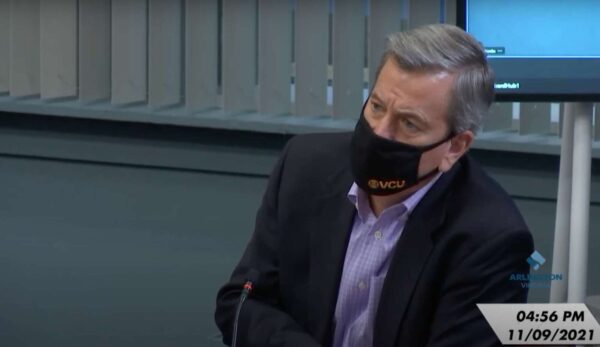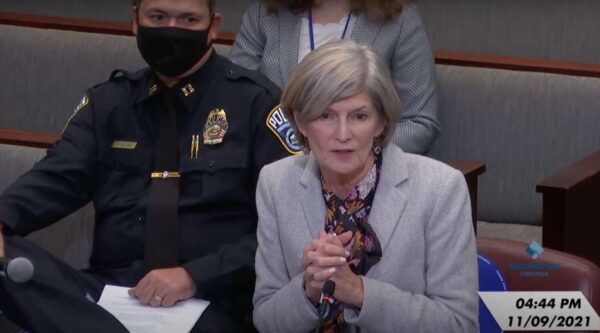
After Republican victories in Virginia last Tuesday, Arlington’s Democratic state legislators say their focus is preserving policy gains they made over the last few years.
Last week, Virginians elected Glenn Youngkin as Governor, Winsome Sears as Lieutenant Governor and Jason Miyares as Attorney General. Despite a slight shift right, Arlington overwhelmingly elected and re-elected all Democrat lawmakers.
Control of the Virginia House of Delegates also appears to shifting to the GOP, pending the outcome of two potential recounts.
“My top priorities are defense, defense and defense,” Rep. Rip Sullivan (D-48) told County Board members yesterday afternoon. “In light of last Tuesday, there are a lot of things that I’ll be interested in making sure we can preserve, in terms of things that have been accomplished over the last couple of years.”
County Board members met Tuesday with state lawmakers to outline the Board’s priorities for the upcoming legislative session — such as vehicle noise enforcement and virtual government meetings — and hear what legislators are focused on.
Among House representatives and state senators, there was an emphasis on preserving work done under outgoing Gov. Ralph Northam.
“In terms of playing defense, as whip for the House Democratic caucus, we are going to be incredibly vigilant in making sure that all of the progress we’ve made [is] not whittled away at the 11th hour, 59th minute, at 7 a.m. subcommittee meetings — that we are casting a very bright light on all the actions taken on the House floor so there’s a very clear record at the end of this long session that people know what they voted for,” said Del. Alfonso Lopez (D-49).
Looking to inject some optimism into the conversation, Board Member Christian Dorsey asked what areas could see bipartisan support. Legislators predicted bridging the aisle to reduce medical debt, expand broadband access, support small businesses, incentivize community college for in-demand jobs, fund mental health services and increase teacher pay.
More locally, the County Board and their state representatives had a number of overlapping priorities: allowing electronic meetings post-pandemic; improving access to childcare; firming up the rights of affordable housing tenants; and committing to environmental sustainability initiatives and teacher pay raises.
Top of mind for County Board members, however, is what they describe as an ongoing behavioral health crisis caused by the closure of most state psychiatric hospitals this summer and exacerbated by police and mental health services workforce shortages. The Board and county staff made the case for more state funding for community-based mental health services.
“This is very time sensitive and very important as we try to serve those most in need in Arlington,” Board Chair Matt de Ferranti said.
Without sufficient state beds to which to bring people in crisis, police have to detain people against their will in emergency rooms for multiple days while staff in the Department of Human Services make calls around the clock, searching for beds.
“They have no privacy, they’re in police custody day after day,” Arlington County Police Department Capt. Michael Rowling said. “I can’t imagine they’re getting better — they’re not getting treatment whatsoever.”
On a daily basis there are five to 10 individuals attended by police officers in the emergency department of Virginia Hospital Center waiting for a mental health bed, Human Services Deputy Director Deborah Warren said.
“It’s inhumane,” she said. “On the worst day of their lives, [people in crisis] are handcuffed to a gurney, under police supervision, agitated and maybe getting sedation.”

Her department is working on a number of regional initiatives to combat this crisis.
A new regional crisis stabilization unit with more than a dozen beds is about to open in Chantilly. A regional crisis call line is set to be established before next summer. Her department is expanding mobile crisis units and trying to adapt Arlington’s crisis intervention center to meet the current needs while grappling with the mental health workforce shortage.
“All of this is not enough,” Warren said.”We have to fund the entire continuum of behavioral health care if we’re going to solve the state hospital crisis problem.”
Sen. Barbara Favola (D-31) said she is working on budget amendments to recruit and retain mental health workers, pay for their clinical supervision, and provide scholarships and bonus pay.
Additionally, she said she is working to expand crisis intervention centers and improve the state’s alternative transport program so that more local governments can stop calling on police officers to transport involuntary admissions to the emergency room.
Some other priorities of note include Sen. Adam Ebbin’s (D-30) focus on allowing licensed marijuana sales sooner and the County Board’s push to tweak the law permitting police oversight boards so that the Board can appoint an independent auditor-monitor for its new Community Oversight Board that handles complaints of police misconduct.

